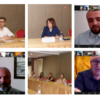On 16 July 2015, European Movement in Albania (EMA) in partnership with Slovak Foreign Policy Association (SFPA) and with the support of the Ministry of Justice and the Ministry of European Integration organised the First Session of Working Group I ”. The session was opened by Mr. Idlir Peçi, Deputy Minister of Justice in Albania
On 16 July 2015, European Movement in Albania (EMA) in partnership with Slovak Foreign Policy Association (SFPA) and with the support of the Ministry of Justice and the Ministry of European Integration organised the First Session of Working Group I ”.
The session was opened by Mr. Idlir Peçi, Deputy Minister of Justice in Albania “While there are a lot of debates about Reform in Justice or the opening of negotiations, sensitive topics such as the Juvenile Justice System are often ignored or forgotten. The recent problematic cases in which children are involved, give us a message to be aware about the importance of the children justice system and the role it has in the society.”
According to Mrs. Vjollca Meçaj, Executive Director of Albanian Helsinki Committee, juvenile justice should not be limited only in the penal system; it is a linkage of manifold elements such as education system, family protection, state and society in general. Therefore, there is a need to enhance the cooperation and well-coordination between the mentioned institutions. Another problem raised by Mrs. Mecaj is the fact that, almost 90% of the minor offenders become recidivist. She proposed as necessary the establishment of a Juvenile Court, with specialised judges and prosecutors in the treatment of children.
Mr. Stefan Matula, expert from Research Institute of Child Psychology and Patopsychology in Slovakia brought his country experience and how could this be implemented in the Albanian reality. In framework of the National Program implemented in Slovakia, was established the Methodical and Research Cabinet of Educational and Psychological Guidance and Prevention part of the Research Institute of Child Psychology and Patopsychology. Concluding, he informed and invited all the interested experts from Albania to participate in a Conference in Bratislava and share experiences.
Mrs. Ina Verzivolli, State Agency for Protection of Child Rights, underlined that the social policies are neglected in the justice sector. The challenges found by the report of the agency for 2013-2014 are too many mentioning the fact that the social aspect is very important, it is suggested an intersectional cooperation between social policies and justice system. Another issue is linked with the age of criminal responsibility. The legislation in Albania does not provide specific services to offenders who are below the age of criminal responsibility, while they are in contact with criminal acts. A more social approach should be introduced, giving priority to education. According to Mrs. Verzivolli, Probation Service is a positive step but qualified specialists in children issues are missing. During discussions, issues such as age of criminal responsibility, intersectional cooperation between social policies and justice system were emphasized by Mrs. Ina Verzivolli, Head of State Agency for Protection of Child Rights. According to Mrs. Verzivolli, Probation Service is a positive step toward the objective. qualified specialists in children issues are needed.
To Mrs. Deljana Nebiu, representative of Probation Service, the most important goal of the Probation Service is to make the alternative sentence a legal-social issue. She mentioned as problematic issue the fact that the Prosecutor Office does not require the reports prepared by the Probation Service regarding the reasons and factors influencing a minor to commit an offence or crime, meaning that this institution neglects the specific features in children cases and lacks qualified experts who could inspect and analyse those reports. The academia provided suggestions regarding amendments to legislation, taking in consideration best practices from the region.



















